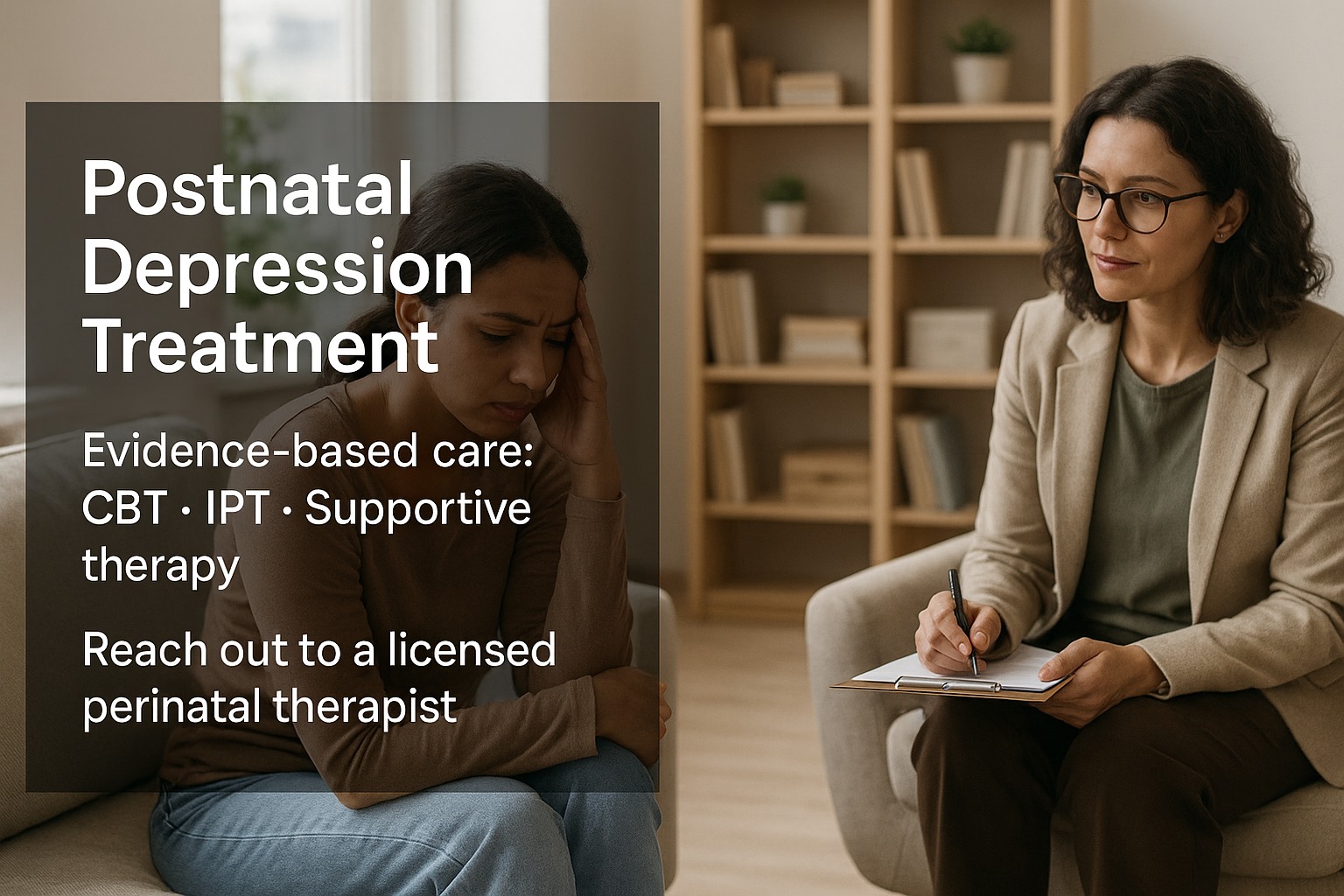What is postpartum depression?
Postpartum depression (PPD) is a treatable mood disorder that can appear during pregnancy or anytime in the first year after birth. It goes beyond the “baby blues.” People with PPD often feel persistent sadness, anxiety, irritability, guilt, or numbness that makes daily life hard.
Common signs:
- Feeling down, empty, or overwhelmed most days
- Loss of interest in things you used to enjoy
- Trouble sleeping (even when the baby sleeps) or sleeping too much
- Appetite changes, low energy, brain fog
- Irritability, anger, or panic
- Feeling like a “bad parent” or that your baby would be better off without you
- Thoughts of harming yourself or not wanting to be alive
If you’re in immediate danger or thinking of harming yourself or your baby, seek emergency help right now. Contact local emergency services or a crisis hotline in your country.
Why psychotherapy for postpartum depression?
Psychotherapy—also called “talk therapy” or counseling—is a first-line, evidence-based treatment for PPD. It helps you understand what’s going on, learn coping skills, rebuild confidence, and strengthen support around you. Many people improve with therapy alone; others combine therapy with medication. Your clinician can help you decide.
Approaches that work
- Cognitive Behavioral Therapy (CBT): Helps you notice unhelpful thought patterns (“I’m a failure”) and replace them with balanced, realistic thoughts. You’ll also practice small behavior changes that lift mood and reduce anxiety.
- Interpersonal Psychotherapy (IPT): Focuses on role changes (becoming a parent), grief, relationship stress, and building social support. IPT is specifically designed for depression and has strong evidence in the postpartum period.
- Supportive Psychotherapy: Provides a safe space to process feelings, validate your experience, and problem-solve day-to-day challenges.
- Couples/Family Therapy: Addresses communication, division of responsibilities, and expectations with partners or family.
- Group Therapy: Normalizes the experience and reduces isolation while teaching skills.
- Teletherapy: Video or phone sessions can be as effective as in-person care and are convenient with a newborn.
What to expect in therapy
- Warm intake & screening: Your therapist asks about your mood, sleep, feeding, birth experience, health history, supports, and safety.
- Personalized plan: You set goals (e.g., reduce anxiety at night, enjoy time with baby, improve sleep routine).
- Skills you’ll learn:
- Calming the nervous system (breathing, grounding, short “reset” routines)
- Reframing self-critical thoughts
- Planning bite-sized activities that bring relief or joy
- Communication and boundary skills with loved ones
- Building a realistic sleep and help-at-home plan
- Length: Many people see progress in 6–12 sessions; others continue longer. Your plan adjusts as you improve.
Is therapy safe while breastfeeding?
Yes. Psychotherapy is non-pharmacological and safe during breastfeeding. If you and your clinician consider medication, they’ll choose options with safety profiles appropriate for pregnancy or lactation and monitor you closely. Therapy and medication can work together.
Self-care that supports therapy (not a replacement)
- Sleep strategy: Share night duties when possible; nap when you can; protect a minimum sleep window.
- Food & fluids: Quick, steady meals and water within reach.
- Movement: Short, gentle walks or stretches as approved by your clinician.
- Connection: Stay in touch with someone kind each day.
- Reduce pressure: Lower the bar for chores; say “yes” to help.
How to find a postnatal therapist near you
Search for “postnatal therapist near me”, “perinatal mental health”, or “maternal mental health therapist.” When choosing, consider:
- Training/credentials in perinatal mental health (e.g., experience with pregnancy, loss, birth trauma, feeding challenges)
- Comfort with CBT and interpersonal psychotherapy for postpartum depression
- Availability for teletherapy
- Cost, insurance, or sliding-scale options
- Whether they welcome partners in some sessions
If access or cost is a barrier, ask your primary care provider, OB-GYN, midwife, or pediatrician for referrals to community clinics, hotlines, or nonprofit programs.
Myths that keep people from getting help
- “I should be happy—what’s wrong with me?” PPD is a health condition, not a personal failure.
- “If I ask for help, I’m a bad parent.” Getting help is responsible and loving.
- “It will go away on its own.” Sometimes symptoms linger or worsen; early support speeds recovery.
A hopeful note
PPD is common and highly treatable. With the right support—psychotherapy, practical help, and sometimes medication—most people recover and feel like themselves again.
FAQs (Quick Answers)
1) What’s the difference between “baby blues” and postpartum depression?
Baby blues are mild mood swings in the first two weeks after birth and usually pass on their own. PPD lasts longer, feels heavier, and affects daily functioning—therapy can help.
2) How soon can I start psychotherapy for postpartum depression?
Anytime during pregnancy or after birth. Earlier support often means faster relief.
3) How long until I feel better?
Some notice improvement in a few weeks; many feel significantly better by 6–12 sessions, especially with consistent practice of therapy skills.
4) What is interpersonal psychotherapy for postpartum depression?
IPT is a structured therapy that targets relationship changes, grief, and support systems during the transition to parenthood. It reduces depressive symptoms and strengthens connections.
5) Can my partner join sessions?
Yes. Many therapists welcome partners to improve communication, divide tasks, and plan rest.
6) What if I don’t have childcare or can’t travel?
Ask about teletherapy, home-based programs, or parent-baby friendly sessions where bringing your baby is welcome.
7) Is therapy confidential?
Generally yes, with standard safety exceptions (e.g., immediate risk of harm). Your therapist will explain privacy policies.
Important safety note
This article is educational and not a substitute for medical care. If you have urgent concerns or thoughts of self-harm, contact local emergency services or a crisis hotline immediately. You deserve support.


Leave a Comment